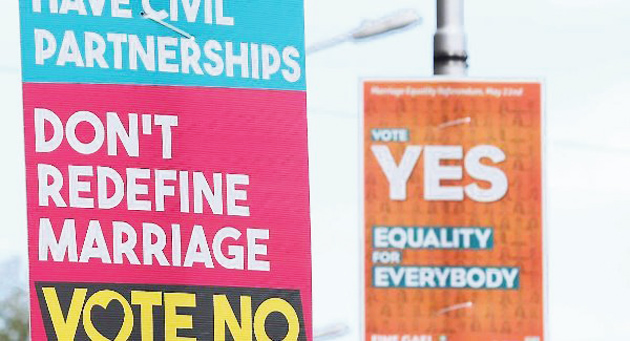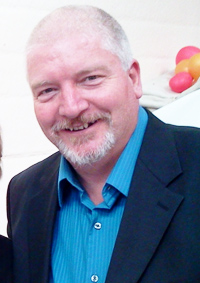All major parties support the “yes” campaign for Friday’s referendum. “We don’t feel that redefining marriage is the best way to tackle the problem of discrimination”, EAI’s Nick Park says.
 Campaigns on Irish streets.
Campaigns on Irish streets.
Next Friday May, 22, Ireland will hold a much-anticipated referendum to decide whether the country will allow same-sex marriage. Evangelicals issued a constructive campaign, defending a Biblical approach but making efforts to have honest conversations with the LGBT community.
Everyone expects the “yes” to win in the referendum later this week, and all major parties have said they support Prime minister Enda Kenny’s initiative.
In a country where Catholicism has been very strong in the past, this Church has become the main actor asking people to vote “no” and keep marriage between a man and a woman.
Homosexual practice was only legalised in Ireland in 1993.
In 2010, the government introduced the Civil Partnership Act, but this week’s referendum could give gay unions full legal equality with heterosexual marriages.
Protestant denominations (Methodists and Presbyterians) are campaigning for the “no”, arguing that “a historic – and Christian – view of marriage as exclusively between one man and one woman. We affirm that it is needed for the common good of society.”
EVANGELICALS ADVICE 'NO', BUT PRIORITISE CONVERSATION
The Evangelical Alliance in Ireland (EAI) has also taken part in the social debate adding a fresh approach to the topic, seeking an honest conversation and arguing that the debate should not focus only on winning the vote on Friday.
People should go beyond the immediate controversy, argued Nick Park, the Executive Director of the EAI in an interview on secular radio station News Talk.
“People should vote with their conscience, but we would advice a ‘no’ vote (…) because we don’t feel that redefining marriage is the best way to tackle the problem of discrimination”. He advocated for a better legality in which all couples are treated equally, without changing marriage.
“Marriage is a community practice (…)The Church certainly doesn’t own marriage, but we also have come to the conclusion that the state does not own marriage. The state has only regulated marriage in Ireland for the latest 160 years.”
Park expressed that the debate about homosexual marriage had become “toxic” in the latest months. “We actually take the view that winning the battle to get the right result in the referendum is not the main thing, and if Christians end up speaking untruthfully, or in ways that dehumanise others, then they’ve lost the battle, irrespective of whether they get the result they want, from the referendum.”
BIBLICAL APPROACH, RESPECT FOR OTHER OPTIONS
Park defended a clear view of sexuality, stating he and the majority of Irish evangelicals believe that sexual intimacy should not happen outside of heterosexual marriage, and that a Biblical understanding therefore sees pre-marital sex, extra-marital and homosexual behaviour as a “distorsion of the original purpose of God.”
 Nick Park. EAI
Nick Park. EAIBut the EAI director made clear that this view does not necessarily mean that “we want this in the law of the land.” The Biblical perspective “primarly informs our morality as Christians as we try our best to live as God wants us to live.”
Park argues that “marriage should get out of the marriage business altogether”. This would mean that both churches and other communities could have their own approach to marriage.
He added that Christians and LGTB communities should reboot their relationship: “We should sit down and talk and listen to one another, because in this current debate, everybody is talking past one another.”
“We need a genuine conversation, and even if we don’t agree… at least we will be able to understand each other better.”
Park said he sees homosexual practice as a “sin”, but also admitted that the Irish society has had an “unhealthy attitude” towards sexual sin in the past.
‘WHO OWNS MARRIAGE?’ AN OPEN CONVERSATION
To promote this dialogue the EAI published the book ‘Who Owns Marriage? A Conversation about Religion, Government, Marriage, and civil Society’, which gives an evangelical view, alongside other positions.
In his essay. Park defends that identity is to be found in Christ, and this will have an impact on all other labels, whether political, sexual or ethnic.
The book “contains a range of perspectives from multiple contributors”, including pastors, theologians but also atheists and gay activists. It aims to “provide food for thought.”
“Whilst EAI does not endorse all of the positions taken by the contributors, we are committed to engage in civil and healthy conversation with all sections of contemporary Irish society and this book is an example of that, dealing specifically with the issues of religion, society, sexuality, and how we define and practice marriage.”
Leaders of the LGTB and Atheist communities were invited to write in the book and did so. “I sat down with them for coffee and shared with them what I believe and why I believe it, and Ilistened to them.”
POLLS GIVE 70% MAJORITY TO “YES”
The Irish Times newspaper suggested some days ago that the “yes” campaign was likely to win. 58% said that gay couples should be able to marry, 25% were against and 17 per cent were undecided.
Evangelicals in Ireland are a minority formed by about 500 churches.

Las opiniones vertidas por nuestros colaboradores se realizan a nivel personal, pudiendo coincidir o no con la postura de la dirección de Protestante Digital.
Si quieres comentar o